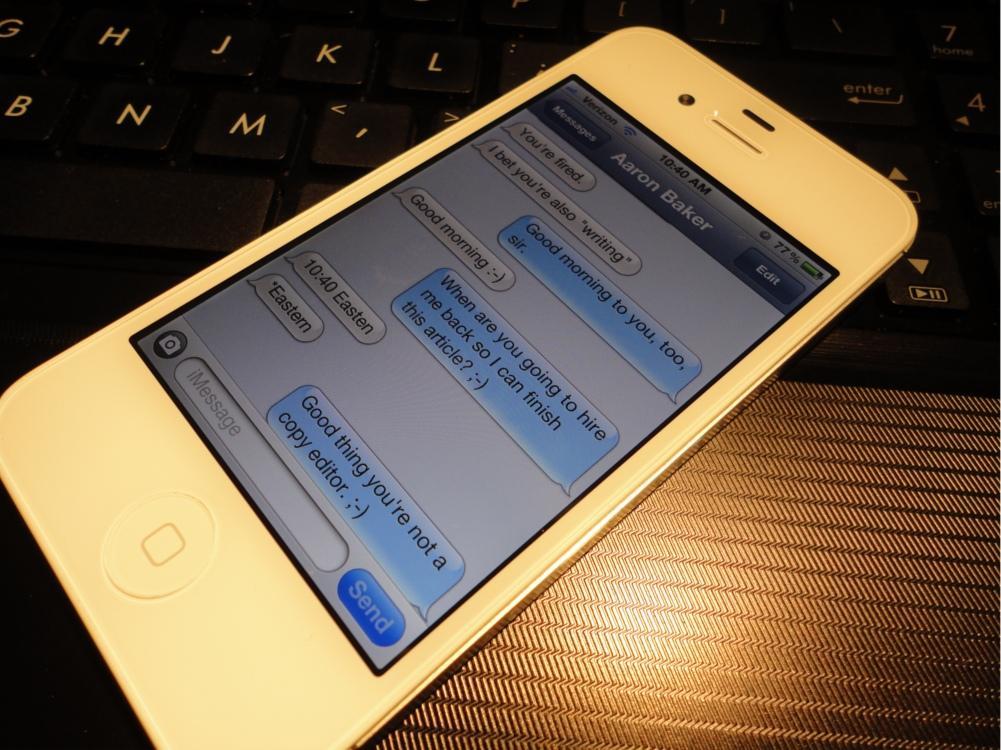
The threat that the sudden growth of instant messaging poses to carrier text messaging is nothing particularly new. In fact, I wrote a piece about it shortly after the Facebook Messenger announcement. But carriers are worried about iMessage, which officially released this past Wednesday. They fear that it could uproot their entire SMS business.
Ed Sutherland of Cult of Mac explains some interesting, yet not very surprising, facts about carrier billed texting. He quotes Sanford C. Bernstein analyst Craig Moffet who claims that with two trillion text messages sent each year, text messaging turns $20 billion in revenue for carriers.
Most unlimited text messaging plans run $20 per month for an individual, or $30 for a family plan. But I imagine a large portion of users don't send nearly enough text messages to constitute paying for unlimited. In fact, as much as I use instant messaging now, I could probably get away with 500 or less text messages per month. Verizon offers a text messaging plan for 500 text messages, but it's outrageously priced at $10. That's $0.02 per text message, which doesn't seem too bad, until you put the prices of using a service like iMessage versus text messaging into perspective. Sutherland explains:
"If you sent 1MB of texts each at 20 cents, you’d rack up $1,500 in charges. However, iMessage could drop that to a fraction — about $1.25 — even after paying $25 per month for a 2GB data plan, the newspaper reports."
(Note: these figures are based on a "pay per text" plan.)
Text and instant messaging aren't all that different in nature or size, they're just routed differently and carriers tend to overcharge for text messages. Sutherland goes on to say that a Waterloo professor has estimated the markup on text messages to be around 4,090 percent. Ouch.
In theory, if everyone decided to use IM over carrier text messaging, the change could be made. But there are still a lot of people clinging to their feature phones, and you have to consider how many different IM services are out there. SMS is universal, while proprietary messengers like BBM or iMessage – plus Google Talk, AIM, LiveProfile and the million other cross-platform services – make it nearly impossible for everyone to find common ground.
Regardless, let's say everyone did make the switch and dropped their carrier text messaging. What would happen?
Instant messaging and social networking has "shrunk texting traffic and eroded profits" in the Netherlands, says the Times. This has led to carriers throwing deals into the mix – like free calling if you sign up for unlimited texting. If US carriers do not want to see the SMS business vanish entirely over the next decade, we will likely see a respectable decrease in the price of texting, too. Or maybe some cheaper calling plans to compensate.
On the other hand, some carriers are welcoming iMessage. Verizon is welcoming iMessage with open arms. According to Cult of Mac, only five percent of the devices sending text messages per year are iOS devices. A spokesman for Verizon told the Times, "From a business perspective, customers still need a data plan to connect to a device. They are only making a choice on how they are using the data." So Big Red apparently feels that over time, data will be more important and lucrative than keeping SMS services around anyway.
Personally, I have found it hard to cut carrier SMS entirely. I have started using IM more than texting over the past several months, but too many of my friends use different services. So tell me, readers. How do you feel about instant messaging over carrier texting? Could you ever make the full switch to IM? Will iMessage make a difference, or do not enough of your friends have iDevices? Should carriers overhaul the pricing of SMS services?